Dental Implants – North Dallas, TX
Replace Missing Teeth from the Bottom Up!

Most tooth replacement options can restore some chewing power, but because they replace only the visible portion of missing teeth, they do not deliver optimum functionality. Dental implants in North Dallas, on the other hand, replace teeth from the roots up, which means they feel and function just like natural teeth. Plus, Dr. Sujal Patel can perform every step of the dental implant process right here in our office using the latest dental technology, ensuring the most successful outcome possible. To learn more about the most comprehensive tooth replacement solution currently available, contact us to book a consultation!
Why Choose Coco Dental of North Dallas for Dental Implants?
- Implants Placed & Restored in One Dental Office
- Computer-Guided Dental Implant Surgery for Precise Treatment
- Flexible Dental Financing Options Available
What Are Dental Implants?

A dental implant actually has three parts: a small titanium post, a replacement tooth, and a metal abutment that connects the two. Other tooth replacements, such as traditional dental bridges and dentures, only recreate the crowns of the teeth – the parts that are visible in your smile. What makes dental implants unique is that they also rebuild the root structure of the teeth that is hidden beneath the gums.
Dr. Patel surgically inserts the titanium implant post into your jawbone in place of the missing tooth roots. From there, it merges with the surrounding bone and tissue thanks to the natural process of osseointegration. This creates a reliable foundation for the abutment and your replacement teeth, which may be a dental crown, bridge, or denture depending on the number of teeth you’ve lost. When you replace missing teeth from the bottom up with dental implants, the end result is a smile that looks and feels just as natural as your old one!
The Dental Implant Process
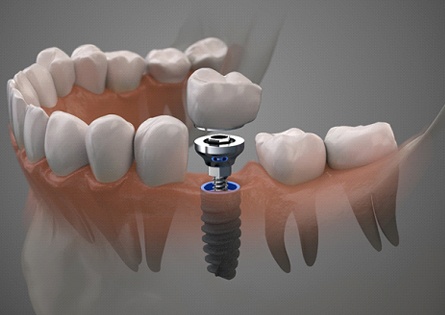
Unlike their traditional counterparts, dental implants require a complex process that can take multiple appointments over the course of several months. However, you should end up with a smile that’s almost exactly like what Mother Nature gave you. Your new teeth can even last for 30+ years if you take proper care of them! Below, you can learn more about the dental implant process and what to expect ahead of your very first consultation with Dr. Patel. To set up your next visit, please give us a call!
Initial Dental Implant Consultation

Every dental implant treatment plan varies slightly, but the four basic steps are almost always the same: the initial consultation, the implant placement surgery, osseointegration, and the delivery of your restorations. At your consultation, we’ll confirm your eligibility to receive dental implants, see how many teeth you’re missing, and evaluate your current oral health. If you need preparatory treatments before you can receive dental implants, you’ll find out during this phase of the process. This could include tooth decay removal, gum disease therapy, bone grafting, or even extraction of existing teeth (which could be done to make room for a denture).
Dental Implant Surgery
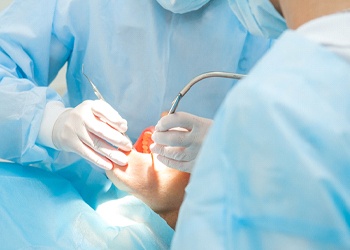
It’s common for general dentists to refer their patients to an oral surgeon when dental implants are needed, but thanks to Dr. Patel’s advanced training, he can handle the entire process under one roof. This saves you time that would otherwise be spent traveling back and forth between dental offices.
During dental implant surgery, a small incision is made inside of the gum tissue so a tiny hole can be created in the jawbone. Once we’ve placed a dental implant, we will stitch the gums closed so it can begin to heal and fuse with the bone tissue. We’ll go over your aftercare instructions in more detail before you leave.
Dental Implant Osseointegration & Abutment
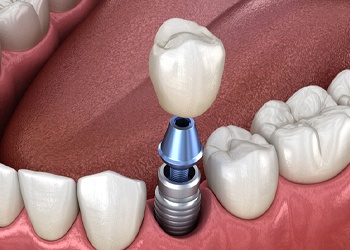
One of the reasons dental implants are so effective at replacing teeth is because of their ability to integrate with existing bone tissue. However, this process takes time (roughly four to six months). You’ll visit our office every several weeks or so, allowing us to monitor your progress and confirm your implants are healing as planned. Eventually, you’ll receive an abutment, which is a small metal connector that attaches the restoration to the implant. When this is attached, you’ll wait a few more weeks before completing the fourth and final stage of your dental implant treatment.
Delivery of Dental Implant Restoration(s)

At your final appointment, you’ll receive your permanent restoration. This could be either a dental crown, bridge, or denture depending on the number of teeth you needed to replace. Your restoration, no matter how complex, is made from custom-colored materials designed to blend in with your neighboring oral structures exactly. That way, only you and our office will know that you received a tooth replacement. Once the restoration is attached, we’ll make sure it fits comfortably and keeps your bite even.
Benefits of Dental Implants

In tooth replacement, you can’t help but be pointed toward dental implants while you consider your options. It’s hard to ignore the many advantages this treatment provides! Although the dental implant process is complex and tends to be more expensive than traditional choices, the pros far outweigh the cons. Choosing to get dental implants in North Dallas can help drastically improve your confidence, health, and overall quality of life.
Day-to-Day Benefits

One of the biggest complaints about dentures is that they can easily slip out of place and cause awkward moments. It can even make you want to avoid smiling, eating, or talking in front of others. With dental implants, you don’t have to constantly worry that your replacement teeth may betray you. They offer several day-to-day benefits, including:
- Increased Confidence – Since implants are firmly grounded in your jaw, so they aren’t going anywhere! They’ll give you the confidence to speak up, eat, and smile in social or professional situations.
- Regained Ability to Eat Most Foods - Dental implants give you about 70 percent of the biting power you used to have, allowing you to feed your body with the healthy food you love. As a result, you may even be able to live longer and with a higher quality of life!
- Easier Maintenance – Caring for dental implants is as easy as caring for natural teeth. You don’t have to worry about incorporating complex steps into your oral hygiene routine or purchasing special products.
Health Benefits

Beyond improving your daily quality of life, dental implants offer some incredible health benefits, such as:
- Jawbone Preservation – Because implants provide the jawbone with internal support, they help prevent the deterioration and bone loss that’s common after tooth loss.
- Protection for Natural Teeth – It’s common for teeth to shift after tooth loss. Fortunately, dental implants serve as a placeholder to ensure every natural tooth stays exactly where it belongs.
- Improved Overall Health – Studies have found a correlation between tooth loss and an increased risk of multiple diseases. Since dental implants are so similar to natural teeth, it’s safe to assume that they can help lower such risks.
Long-Term Benefits

By choosing to get dental implants right now, you can enjoy several long-term benefits, including:
- High Success Rate – Dental implants have an incredible success rate of about 95% even 20 years after they’ve been placed.
- Youthful Appearance – Without tooth roots to stimulate the jawbone, the body quickly reallocates nutrients elsewhere, causing this bone to shrink and change shape. However, dental implants keep the jawbone stimulated, just like tooth roots, helping you retain a more youthful appearance as you continue to age.
- Longer Lifespan – Dental implants keep the jawbone strong under the gums, which means that deterioration occurs much more slowly. As a result, they can last for more than 30 years with proper maintenance.
Who Dental Implants Can Help

Whether you need to replace one tooth, multiple teeth, or even a full arch, dental implants can give you back the complete smile you used to have. In fact, virtually any healthy adult can qualify for this treatment! When you meet with Dr. Patel for your dental implant consultation, he’ll evaluate whether you’re a good candidate, and even if you’re not at first, he can usually help you become one. Then, he’ll create a custom treatment plan designed to meet your unique needs.
Who Is a Good Candidate for Dental Implants?

If you’re missing one or more teeth and are generally healthy, chances are you’re a good dental implant candidate. With that being said, you’ll need to meet three key criteria before your treatment can begin:
- Good overall health – Although dental implant surgery is a relatively minor procedure, it’s still surgery. You’ll need to be well enough to recover from it without issue.
- Great oral health – Gum disease or decay in your remaining teeth could result in your implants failing, so your dental implant dentist in North Dallas will need to address these problems beforehand.
- Strong jawbone – The implants need adequate jawbone density in order to form a lasting attachment.
Even if you don’t seem like a good candidate at first, there’s a high likelihood that you can get dental implants. In fact, many of our patients need to complete one or more preparatory treatments before dental implant placement. These include tooth extractions, gum disease therapy, and bone grafting to strengthen a jawbone that may have atrophied after tooth loss.
Once Dr. Patel has deemed you eligible for dental implants, he can base your treatment around the number of teeth you need to replace.
Missing One Tooth

To replace a single tooth, we position one implant post into the gap and top it with a custom dental crown. Because the crown will be made from lifelike dental porcelain, no one will even be able to tell the difference! Plus, an implant won’t require two of your remaining teeth to be filed down, which can’t be said for a traditional dental bridge. Removing enamel from natural teeth can leave those teeth weaker and more sensitive, so a dental implant is definitely the healthier and more conservative option.
Missing Multiple Teeth

If you’re missing multiple consecutive teeth, we can seamlessly rebuild your smile with an implant bridge. Instead of relying on two of your natural teeth, an implant bridge is secured onto two dental implant posts – each one placed at either end of the gap. That way, you don’t necessarily need to get a dedicated implant for each lost tooth. If you’re missing multiple teeth that are not in a row, then a small number of implants can be used to support a partial denture that delivers much more security and longevity than its traditional counterpart.
Missing All Teeth
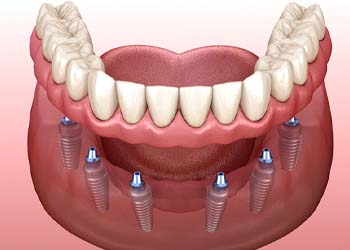
By positioning four to eight dental implants at various locations in your jaw, we can create a foundation for a full denture. Compared to traditional prosthetics, an implant denture looks and feels leaps and bounds more natural. You’ll be able to eat whatever you’d like and smile confidently without worrying about your teeth moving around. We can design your implant denture to be either removeable or fixed in place like natural teeth.
Understanding the Cost of Dental Implants

You don’t need to settle for anything less than the best when replacing your missing teeth. It’s true you’ll initially pay more for dental implants than traditional treatments, but they are more affordable than you might realize. While you could look for the cheapest option, you’ll get what you pay for. Instead of focusing on the price, consider other factors to ensure the long-term success of your new smile, like the qualifications of the dentist and the materials used. When budgeting for the treatment, here’s how to factor the cost of dental implants in North Dallas.
Preliminary Treatments & Dental Implant Surgery

Most patients who have good oral and general health are candidates for dental implants in North Dallas, but your dentist may recommend additional procedures before your placement surgery, like gum disease therapy, tooth extractions, or bone grafting. Any preliminary treatments will increase the cost, but it’s money well-spent to ensure your dental implants have a healthy foundation. You will also need to pay for your dental implant surgery. We can handle the entire process in-house, so you don’t need to worry about paying any specialist fees.
The Parts of Your Dental Implant

The number of teeth you’re treating will also affect the price because you’ll require more posts, abutments, and larger restorations. The manufacturer and brands you choose will also have different fees. Your implant dentist in North Dallas will help you choose high-quality materials that accommodate your budget.
Final Dental Implant Restoration

One of the biggest contributors to the amount you’ll pay is your restoration. Generally, you can expect to pay less for a single restoration than a bridge or denture. We’ll go over the cost for the type of prosthetic you need to make the best decision for your new smile.
Does My Dental Insurance Cover Dental Implants?

It is rare for a dental insurance to pay the entire amount of the dental implant process; however, you may be able to use your benefits to lower certain costs of your treatment. Although every insurance policy is unique, many plans can be used to offset the fees for the consultation, imaging, or restoration. We will work on your behalf with your insurance company to file the necessary claim forms to maximize your benefits until reaching your annual limits. We work with several leading insurance companies to replace your missing teeth without breaking the bank.
Making Dental Implants Affordable

Besides using your dental insurance, we also accept several other payment methods. We will work with you to help you find the solutions you need, such as:
- Traditional Methods: We accept all forms of traditional payment, including cash, check, and most major credit cards.
- Dental Financing: We offer payment plans through CareCredit, a third-party financier. You can pay for your treatment without worrying about any interest over 6 to 36 months.
Don’t let the cost of dental implants deter you from replacing your missing teeth. We’ll explain the fees for each step in your treatment, so you’ll know exactly what you’ll be paying before committing to any procedure.
Dental Implant Technology
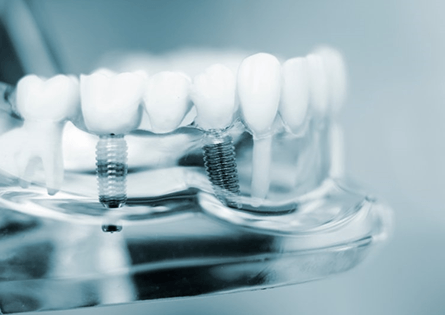
Unlike other traditional restorative treatments, dental implants offer comprehensive and natural-feeling results that can last a lifetime with proper care. To ensure they are successful and effective, our team utilizes modern advanced technology that allows us to create brand-new teeth that’ll specifically match your unique smile. On top of the training that our implant dentist in North Dallas has undergone, our procedure depends on precision offered by devices such as the 3D CT cone beam scanner and our digital impression system to map out the specifics of your treatment plan. Keep reading to find out more about these advanced technologies that are essential for successfully rebuilding your missing pearly whites.
3D Cone Beam CT Scanning
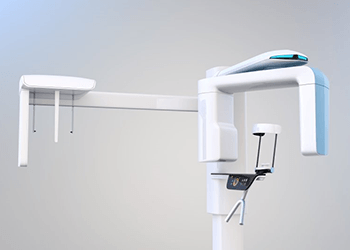
One of the most important things that allows us to create a detailed dental implant treatment plan is our ability to map your entire mouth with the 3D cone beam CT scanner. Digital X-rays can help us understand the general oral structures of your mouth that we can’t usually see, such as your jawbone and tooth roots. Still, they aren’t capable of seeing everything. For this reason, we use the cone beam CT scanner to reveal the intricate details of your oral cavity, including the blood vessels, nerve pathways, and the density of your jawbone! Not only will this provide us with a much clearer image of your situation, but we’ll also face significantly less surprises when working on your smile. With the details laid out for us, we can develop the best treatment plan to ensure a higher chance of dental implant success.
Digital Impression System
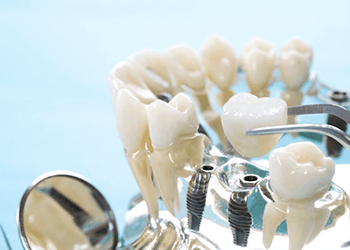
Dental implants are designed to serve as your new permanent roots, which will then provide a stable foundation for your new personalized restoration to restore your beautiful and healthy smile. Depending on how many teeth you need to replace, you can end up receiving either a dental crown, bridge, partial denture, or full denture to renew your bite. To ensure you have a durable, comfortable, and natural-feeling restoration, our team will construct your new teeth out of dental porcelain for lifelike and long-lasting results. Before we can do this, however, we’ll need to map out your smile so that your restoration(s) will fit with the rest of your teeth. Dentists previously used a sticky putty to do this, which wasn’t very comfortable for most patients. Today, we use a digital impression system to scan your smile and develop a model of your bite without even having to touch your teeth! This layout will then be used to fabricate your custom restoration.
Maintaining & Caring for Your Dental Implants

Dental implants are one of the most effective methods for replacing missing pearly whites. However, if you want to make the most of your restorations for many years to come, you’ll need to make sure to maintain them regularly. That’s why our team at Coco Dental of North Dallas has listed some of the most common ways you can preserve your new teeth and the benefits for your dental health. With a proactive approach, you can guarantee a healthier and long-lasting solution for restoring your smile. Read along or give us a call if you’d like to learn more about dental implant care in North Dallas today!
Make Oral Hygiene a Priority

While your dental implants won’t get cavities, the rest of your smile can still be vulnerable to bacteria, decay, and infection. To avoid more serious dental health complications, such as gum disease and further tooth loss, you’ll need to practice proper oral hygiene every day. This includes brushing twice daily, flossing at least once, and rinsing regularly with mouthwash. Not only will this help keep your natural teeth clean and strong, but you’ll also maintain healthy bone tissue as a stable foundation for your dental implants in the long run.
Eat a Healthy Diet

Eating sugary treats or pastries isn’t always a bad thing. However, consuming these foods too frequently without cleaning your teeth can increase the risk of tooth decay and bacteria buildup. By leaving this unchecked, your dental implants can be more likely to fail later on. Instead of snacking on candies and chips, try changing up your diet with more veggies, fruits, lean meats, dairy, and leafy greens. These nutritional meals can benefit your dental and overall health, especially those rich in calcium and vitamin C, as they can encourage strong tooth enamel, gum health, and jawbone tissue.
Break Bad Habits

Poor oral habits like smoking, using your teeth as tools, or biting your nails can potentially cause damage to your dental implants and other natural teeth. To avoid ending up back where you started with tooth loss, it’s best to quit these behaviors ahead of time. This way you can preserve the condition of your dental implants as well as their success. And if you still feel the urge to chew on something, then try sugar-free gum for a healthier alternative.
Protect Your Dental Implants

Do you tend to grind your teeth when stressed or sleeping? Are you involved in contact sports where you can potentially take a hit to the face? If so, then you might consider investing in nightguards for bruxism or athletic mouthguards to protect your pearly whites. You’ll help maintain your dental implants and prevent more serious issues like TMJ disorder or a knocked-out tooth. Ask our team about these treatments if you’re interested, and we’ll be happy to determine which option will be best for you!
Schedule Regular Dental Checkups

By visiting us every six months or sooner for dental checkups and teeth cleanings, we can help monitor your oral health and ensure your dental implants remain safe and strong. We’ll also check for any developing issues that we can address early before they can become bigger problems. This will prevent you from needing to seek more timely or costly treatments later on, allowing you to enjoy your fully restored smile for a lifetime.
Dental Implant FAQs
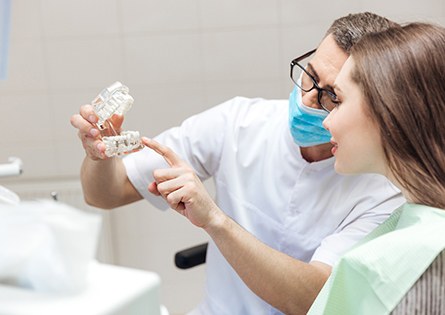
Are you ready to replace your missing teeth from the bottom up? Dr. Patel has helped countless patients achieve full, healthy, beautiful smiles with state-of-the-art dental implants. If you have a specific question for him before moving forward, don’t hesitate to contact our office to schedule a one-on-one consultation. On the other hand, if you would prefer to learn more about this modern tooth replacement solution first, keep reading for the answers to a few frequently asked questions!
Does Getting Dental Implants Hurt?
Since many patients’ anxiety stems from fear of pain, it’s not unexpected that this is one of the most common questions we get. So, if you’ve asked yourself something similar, then you are not alone. Fortunately, you’ll be happy to learn that Dr. Patel goes above and beyond to make the process as pain-free as possible by using an anesthetic during the procedure and providing you a list of specific aftercare instructions to follow during your recovery.
Are Dental Implants Safe?
Did you know that the first dental implants were crafted from materials like seashells and animal bones? So, as you can imagine, replacing one or more missing teeth wasn’t a safe, long-term solution. Fortunately, dental implants have come a long way since then thanks to high-quality materials, state-of-the-art technology, and the latest techniques. In fact, they currently hold a whopping 95% success rate, making them incredibly safe for patients of all ages!
How Long Do Dental Implants Last?
Once you see your beautiful new teeth and feel your restored bite force, you’re going to want your dental implants in North Dallas to last as long as possible. The good news is that they can last 20+ years with proper care! To prolong their lifespan, make sure to implement a solid oral hygiene routine and visit our office twice a year for a routine checkup and cleaning. That way, we can ensure your mouth is infection-free and address small issues with your implant before it necessitates a full replacement.
What Should I Expect from the Dental Implant Recovery Process?
Once your procedure is complete, it is a good idea to take it easy the next couple of days, especially if you have multiple dental implants. While you may experience some discomfort and gum irritation, sticking to soft foods, rinsing with a mixture of salt and warm water, and gently completing your oral hygiene routine will prevent irritation. You can also use a cold compress to alleviate any swelling and take over-the-counter medication as instructed to manage any discomfort. As always, we will stay in touch with you to ensure you are healing properly, and we are only one phone call away if you have any questions.
What Causes a Dental Implant to Fail?
Although dental implants have an impressive success rate, certain risk factors can cause them to fail. Improper placement, the implant site’s inability to heal, and neglecting your aftercare instructions are a few short-term issues that can lead to complications. On the other hand, poor oral habits (like chewing on ice), skipping your bi-yearly visits, and neglecting to brush and floss your teeth twice a day can lead to failure down the line.
Dental Implant Failure & Salvage

Most dental implants do well in the long run. It’s to the point that their ten-year success rate stands at over 95%! That said, even these amazing posts can fail at times. There’s always a slight risk that an implant will stop working and cause unwanted symptoms. If such a thing happens, Dr. Patel and our dental team can resolve your dilemma. We’ll perform a dental implant salvage treatment that saves your fully-restored smile!
Learn More About Dental Implant Failure & Salvage
Dental Implants Post-Op Instructions

You’ll need to set some time aside to recover after dental implant surgery. There’s no reason to be nervous; our team will let you know what you can expect during the process as well as the steps you can take to help your smile heal properly. Below is a basic outline of what you should do after dental implant surgery. Remember that if you experience intense pain or symptoms beyond what our team says is normal, you should call our office immediately.
What to Do Directly After Dental Implant Surgery

During the first part of the healing process, your main concern should be protecting the blood clot that has formed around the healing site. This blood clot needs to stay in place to make sure the healing process goes smoothly. There are certain behaviors you’ll need to avoid to keep the blood clot safe:
- Do not spit; use tissues to get rid of excess saliva instead.
- Do not use straws; drink any liquids straight out of the glass.
- Do not touch the surgical site with your fingers or your tongue.
Common Side-Effects When Recovering from Dental Implant Placement

There are a few mild side effects that you can typically expect after dental implant placement:
- Intermittent Bleeding: This can last for multiple days and can be controlled by applying light pressure with gauze to the area.
- Swelling: This can last anywhere from three days to over a week. You can reduce swelling with a cold or warm compress.
- General Discomfort: You might feel some soreness after the numbness in your mouth has worn off. Pain medication can help you keep it under control.
All of these symptoms should go away on their own over time. Please let us know if they persist longer than they should.
Your Diet After Dental Implant Surgery

When planning post-implant surgery meals, the key thing to remember is that you’ll need to stick to soft foods for a while. Mashed potatoes, yogurt, ice cream, pudding, scrambled eggs, and pasta are all good choices. You’re free to return to your normal diet as soon as you feel comfortable doing so, although it’s best to limit crunchy or tough foods for a while. You should also avoid chewing directly on the implant site until you’ve received a restoration.
Post-Op Health & Oral Hygiene

You can continue brushing your teeth normally the day after your surgery. Be very careful when brushing near the implant site. While your mouth is recovering, rinse at least two or three times a day with salt water, as this can help you reduce your risk of infection. If you use mouthwashes, make sure that they don’t contain alcohol.
What to Do After Your New Teeth are Attached

Your new teeth will be attached once your mouth has fully healed from dental implant surgery. At that point, the hardest part is already over; you might experience some minor sensitivity in your gum tissue that needs to be managed with pain medication, but that is the only side effect you should notice at that point. You’ll be ready to use your new restoration to eat and smile right away.
